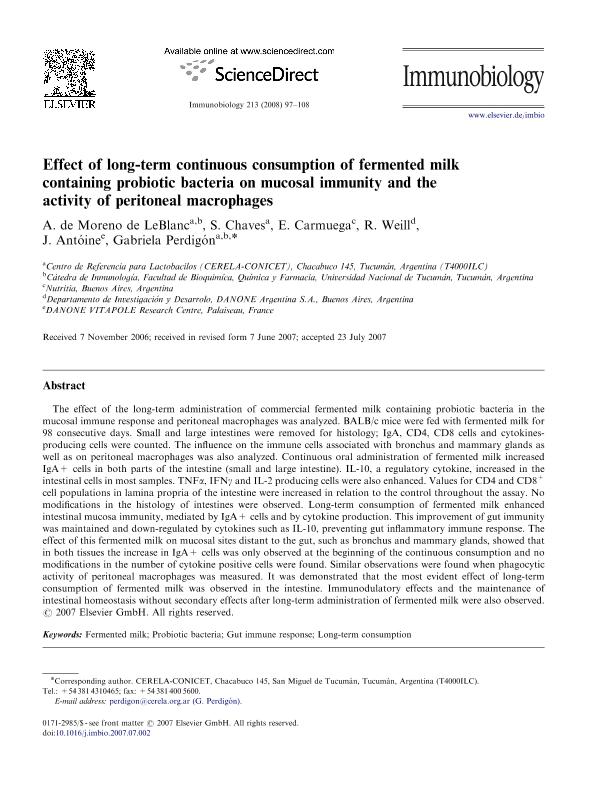Mostrar el registro sencillo del ítem
dc.contributor.author
de Moreno, Maria Alejandra

dc.contributor.author
Chaves, Analia Silvina

dc.contributor.author
Carmuega, Esteban
dc.contributor.author
Weill, Ricardo
dc.contributor.author
Antóine, J.
dc.contributor.author
Perdigon, Gabriela del Valle

dc.date.available
2018-08-21T20:43:07Z
dc.date.issued
2008-03
dc.identifier.citation
de Moreno, Maria Alejandra; Chaves, Analia Silvina; Carmuega, Esteban; Weill, Ricardo; Antóine, J.; et al.; Effect of long-term continuous consumption of fermented milk containing probiotic bacteria on mucosal immunity and the activity of peritoneal macrophages; Elsevier Gmbh; Immunobiology; 213; 2; 3-2008; 97-108
dc.identifier.issn
0171-2985
dc.identifier.uri
http://hdl.handle.net/11336/56461
dc.description.abstract
The effect of the long-term administration of commercial fermented milk containing probiotic bacteria in the mucosal immune response and peritoneal macrophages was analyzed. BALB/c mice were fed with fermented milk for 98 consecutive days. Small and large intestines were removed for histology; IgA, CD4, CD8 cells and cytokines-producing cells were counted. The influence on the immune cells associated with bronchus and mammary glands as well as on peritoneal macrophages was also analyzed. Continuous oral administration of fermented milk increased IgA+ cells in both parts of the intestine (small and large intestine). IL-10, a regulatory cytokine, increased in the intestinal cells in most samples. TNFα, IFNγ and IL-2 producing cells were also enhanced. Values for CD4 and CD8+ cell populations in lamina propria of the intestine were increased in relation to the control throughout the assay. No modifications in the histology of intestines were observed. Long-term consumption of fermented milk enhanced intestinal mucosa immunity, mediated by IgA+ cells and by cytokine production. This improvement of gut immunity was maintained and down-regulated by cytokines such as IL-10, preventing gut inflammatory immune response. The effect of this fermented milk on mucosal sites distant to the gut, such as bronchus and mammary glands, showed that in both tissues the increase in IgA+ cells was only observed at the beginning of the continuous consumption and no modifications in the number of cytokine positive cells were found. Similar observations were found when phagocytic activity of peritoneal macrophages was measured. It was demonstrated that the most evident effect of long-term consumption of fermented milk was observed in the intestine. Immunodulatory effects and the maintenance of intestinal homeostasis without secondary effects after long-term administration of fermented milk were also observed.
dc.format
application/pdf
dc.language.iso
eng
dc.publisher
Elsevier Gmbh

dc.rights
info:eu-repo/semantics/openAccess
dc.rights.uri
https://creativecommons.org/licenses/by-nc-sa/2.5/ar/
dc.subject
Fermented Milk
dc.subject
Gut Immune Response
dc.subject
Long-Term Consumption
dc.subject
Probiotic Bacteria
dc.subject.classification
Inmunología

dc.subject.classification
Medicina Básica

dc.subject.classification
CIENCIAS MÉDICAS Y DE LA SALUD

dc.title
Effect of long-term continuous consumption of fermented milk containing probiotic bacteria on mucosal immunity and the activity of peritoneal macrophages
dc.type
info:eu-repo/semantics/article
dc.type
info:ar-repo/semantics/artículo
dc.type
info:eu-repo/semantics/publishedVersion
dc.date.updated
2018-07-23T18:14:05Z
dc.identifier.eissn
1878-3279
dc.journal.volume
213
dc.journal.number
2
dc.journal.pagination
97-108
dc.journal.pais
Alemania

dc.description.fil
Fil: de Moreno, Maria Alejandra. Consejo Nacional de Investigaciones Científicas y Técnicas. Centro Científico Tecnológico Conicet - Tucumán. Centro de Referencia para Lactobacilos; Argentina. Universidad Nacional de Tucumán. Facultad de Bioquímica, Química y Farmacia; Argentina
dc.description.fil
Fil: Chaves, Analia Silvina. Consejo Nacional de Investigaciones Científicas y Técnicas. Centro Científico Tecnológico Conicet - Tucumán. Centro de Referencia para Lactobacilos; Argentina
dc.description.fil
Fil: Carmuega, Esteban. Nutritia; Argentina
dc.description.fil
Fil: Weill, Ricardo. DANONE Argentina S.A. Departamento de Investigación y desarrollo; Argentina
dc.description.fil
Fil: Antóine, J.. DANONE VITAPOLE. Research Centre; Francia
dc.description.fil
Fil: Perdigon, Gabriela del Valle. Universidad Nacional de Tucumán. Facultad de Bioquímica, Química y Farmacia; Argentina. Consejo Nacional de Investigaciones Científicas y Técnicas. Centro Científico Tecnológico Conicet - Tucumán. Centro de Referencia para Lactobacilos; Argentina
dc.journal.title
Immunobiology

dc.relation.alternativeid
info:eu-repo/semantics/altIdentifier/doi/http://dx.doi.org/10.1016/j.imbio.2007.07.002
dc.relation.alternativeid
info:eu-repo/semantics/altIdentifier/url/https://www.sciencedirect.com/science/article/pii/S0171298507000885
Archivos asociados
